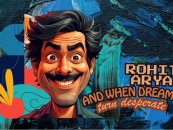-853X543.jpg)
POLITICS: THE DISTURBING RISE OF LYNCHING
by HUMRA QURAISHI September 8 2024, 12:00 am Estimated Reading Time: 5 mins, 2 secsHow many more lives will be taken in the name of beef? The unchecked violence, fuelled by communal hatred and political backing, demands immediate accountability to stop the lynchings of innocent citizens. Humra Quraishi writes…
Photography: Vinta Nanda
The alarming rise in beef-related lynchings across India, driven by communal hatred and Hindutva extremism, highlights the deadly consequences of unchecked violence. From the brutal killing of Muslims and Dalits to the spread of misinformation about beef consumption, these acts are tearing at the fabric of India's diverse society. With political backing emboldening cow vigilantes, innocent lives are lost, and minorities are targeted. It’s time to demand justice and hold perpetrators accountable before this communal violence spirals further out of control. Lynching in India, fuelled by propaganda, must be stopped to safeguard the nation's unity.
Hindutva Influence and State Machinery
The rise in lynchings on the pretext of beef consumption or cow protection has coincided with the growing influence of right-wing politics, particularly Hindutva ideology. It’s clear that the mobs behind these heinous acts feel emboldened, knowing they have the tacit approval of the political apparatus in power. The situation is even more alarming when we consider that state machinery—law enforcement, administration, and the judiciary—has been slow to act against the perpetrators. Instead, the focus seems to have shifted towards safeguarding the majoritarian narrative, further marginalizing already vulnerable communities.
Humiliation and Violence: The Daily Reality for Minorities
The violence is not limited to physical lynching. Humiliation of minorities, especially Muslims, has become a daily occurrence. A recent case from Maharashtra highlights this—an elderly Muslim man was humiliated and attacked by three men on a train, accused of carrying beef. Upon investigation, it was found that he wasn’t carrying beef at all. Disturbingly, the attackers were enroute to a police recruitment test. The fact that such individuals were potentially on the verge of joining law enforcement is a chilling reminder of the deep communal biases that exist within the system.
This brings forth the larger question: are there any mechanisms in place to ensure that our police forces are free from communal biases? It seems crucial that cops undergo training sessions that emphasize equality and discourage targeting individuals or groups based on unfounded myths and communal stereotypes.
The Spread of Communal Poison
Communal hatred is being deliberately unleashed, and this poison trickles down to every layer of society. Political leaders, instead of calming tensions, seem to stoke the flames. Himanta Biswa Sarma, the Chief Minister of Assam, has repeatedly made inflammatory statements against Muslims without facing any significant repercussions. These blatant communal speeches only serve to embolden the masses and create an environment ripe for violence.
3.jpg)
Recent Incidents: Violence in Haryana and Maharashtra
In the last two weeks, two stark examples of this hate-driven violence came to light in Haryana. Sabir, a migrant worker from West Bengal, was lynched to death, and another, Asiruddin, was severely wounded. The reason? They were suspected of eating beef. The attackers, driven by their Hindutva ideologies, showed no mercy. In a separate incident, a Hindu student named Aryan Mishra was killed by cow vigilantes in Faridabad because they mistook him for a Muslim.
This violence, however, isn't confined to Haryana. The echoes of communal madness can be heard across states like Uttar Pradesh, Delhi, Rajasthan, and Jharkhand. These regions have become hotspots for communal violence, as seen in the lynching of Mohammad Akhlaq in Dadri, Uttar Pradesh, back in 2015. His death was a stark reminder of how dangerous communal hatred has become.
Silence and Inaction: A Society Numbed
Perhaps one of the most unsettling aspects of these incidents is the silence that follows. When two Muslim cattle traders were killed and their bodies hung from trees in Jharkhand, one of the victims being a 13-year-old boy, there was barely a cry of outrage. Neither the Minority Commissions nor Child Rights groups raised their voice. How long will we stay silent? How long will we allow these acts to continue without demanding accountability?
Systemic Brutality
In 2016, two Muslim men in Faridabad were forced to eat cow dung and drink cow urine. This happened just 20 kilometres from New Delhi, not in some remote corner of the country. The mob’s brutality was unleashed so close to the nation's capital, yet the outrage was minimal, the response tepid.
Similarly, Kashmiri students in Rajasthan were publicly humiliated and beaten for allegedly buying beef, though they had only purchased mutton. These incidents are no longer isolated but part of a larger, more systematic pattern of targeting minorities based on fabricated communal allegations.
Propaganda and the Demonization of Minorities
The systematic propaganda being spread today is dangerous. A narrative is being built that only Muslims, Dalits, and Christians consume beef, painting them as villains in a society that reveres the cow. The propaganda suggests that these communities are somehow subhuman, indulging in practices that are morally and culturally reprehensible. This demonization of minorities further alienates them and justifies violence in the eyes of the perpetrators.
However, a simple conversation with butchers and meat suppliers across the country would reveal the truth—Muslims are not the largest consumers of meat in India. The meat industry is dominated by non-Muslims. This narrative of Muslim ‘cannibalism’ is not only baseless but harmful.
The Beef Alibi: Social and Economic Consequences
The beef alibi has also begun to impact the socio-economic fabric of society. In recent years, many middle-class Muslim families have stopped serving meat at their gatherings out of fear of violent reprisals. At a wedding I attended, the hosts served a pure vegetarian menu, worried that the slightest suspicion might invite violence from Hindutva mobs. This is the sad reality that Muslims must navigate today—constant fear of attack over what is served at their dinner tables.
Meanwhile, double standards abound. Right-wing politicians from the North-East openly discuss their beef-eating traditions, yet the poor, the marginalized, and the powerless are attacked or killed over mere suspicions.




-173X130.jpg)
-173X130.jpg)
-173X130.jpg)
-173X130.jpg)

-173X130.jpg)

-173X130.jpg)